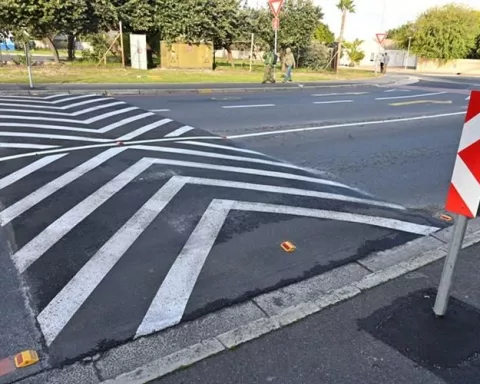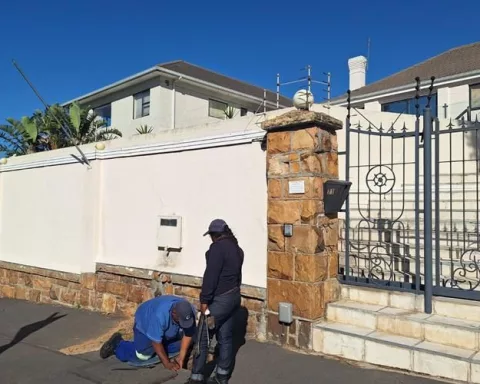Cape Town is leading the way in modern transport with exciting new technologies. They’ve installed thermal sensors at pedestrian crossings to make traffic flow smoother and created a reversible bus lane just for MyCiTi buses, cutting down travel time. To fight theft, the city is using special underground chambers to keep vital equipment safe. As part of Transport Month, local leaders are inviting residents to learn about these innovations and get involved in shaping the city’s transport future. With these changes, Cape Town is on the path to a greener and more efficient way to get around!
What are the key innovations in Cape Town’s transport system?
Cape Town is pioneering urban mobility through innovative technologies like thermal sensors at pedestrian crossings, a reversible MyCiTi bus lane, and underground utility chambers to prevent theft. These advancements enhance traffic flow, improve safety, and promote sustainable transport solutions in the city.
A Golden Beginning
The sun bathed the Civic Centre in Cape Town in a golden hue as experts converged for a dynamic panel discussion on mobility innovation. Organized by the City’s Urban Mobility Directorate in celebration of Transport Month, this gathering aimed to delve into how groundbreaking technology and strategic initiatives could transform urban transport, build resilient infrastructure, and foster environmental sustainability.
Throughout history, transportation advancements have been catalysts for societal change. The introduction of the steam engine and the advent of automobiles reshaped not just mobility but also economic landscapes and societal structures. Today, Cape Town stands at a similar juncture, with the Urban Mobility Directorate spearheading revolutionary innovations that position the city at the cutting edge of modern urban transport in South Africa.
Councillor Rob Quintas set the stage with a compelling vision, drawing analogies between historical transport revolutions and today’s technological advancements. “We are experiencing a new transport renaissance with complex challenges,” he stated, echoing the daring spirit of early inventors. Quintas highlighted the second phase rollout of the MyCiTi bus service to the metro-southeast, showcasing the city’s commitment to sustainable transportation. This phase features the impressive Sky Circle in Lansdowne, plans for electric bus procurement, and the establishment of new industry benchmarks.
Technological Innovations
Cape Town’s approach to urban mobility stands out due to its inventive use of technology. Take, for instance, the thermal sensors installed at four pedestrian crossings in Blaauwberg. These sensors, a common feature in Europe, mark their debut in South Africa. Positioned along Marine Drive, Otto du Plessis Drive, and nearby streets, the sensors detect pedestrian movement. If a pedestrian exits the detection zone before the light changes, the request is canceled, thereby reducing unnecessary stops for vehicles and enhancing traffic flow.
Another significant innovation is the reversible MyCiTi bus lane along the R27 between Loxton Road and Broad Road in Milnerton. Reserved exclusively for MyCiTi buses, this lane operates inbound during morning rush hours and outbound in the afternoon. A sophisticated system comprising two AI thermal cameras monitors the lane, detecting unauthorized vehicles, reverse entries, and exits. The Transport Management Centre (TMC) oversees this system, ensuring seamless operation and safety. Should an issue arise, the system alerts the TMC, prompting immediate action.
Cape Town also addresses the chronic urban issue of infrastructure theft and vandalism through innovative solutions. The Urban Mobility Directorate has initiated a pilot project featuring underground chambers, also known as prefabricated underground utility manholes. These chambers house traffic signal controllers and uninterrupted power supply (UPS) systems. Due to their placement a few meters underground and attachment to a concrete base, these non-metallic, ribbed chambers deter theft through inaccessibility and lack of resale value. Only trained technicians can access them, offering a robust solution to this persistent problem.
Engineering Marvels and Community Engagement
One of Cape Town’s crowning achievements in engineering is the freestanding elevated traffic circle at the intersection of Govan Mbeki Road and Jan Smuts Drive in Lansdowne. As the first of its kind in South Africa, this project exemplifies trailblazing engineering. Positioned 6.2 meters above ground, the circle serves exclusively MyCiTi buses, reducing travel time between Mitchells Plain, Khayelitsha, Wynberg, and Claremont. By segregating buses from general traffic, the city ensures that the MyCiTi service operates efficiently, unaffected by ground-level congestion.
In celebration of Transport Month, the Urban Mobility Directorate is actively engaging with communities through roadshows across Cape Town. These events provide residents with insights into current and upcoming projects, as well as opportunities to explore careers in transport. The roadshows embody the Directorate’s commitment to transparency and community involvement, inviting residents to partake in the city’s transport evolution.
Residents from different districts can interact with the Urban Mobility team at various locations. The Northern district’s event is scheduled for October 10 at the Civic Centre in Parow. For the Central district, the roadshow will take place in Table View on October 15 at Leibrandt van Niekerk Community Hall. The Southern district can join the event in Athlone on October 24 at the Dulcie September Civic Centre. Lastly, the Eastern district’s session will be held in Somerset West on October 29 at Garden Village Community Hall. Each event runs from 15:00 to 19:00, providing ample time for residents to engage with officials.
A Call for Community Involvement
Councillor Quintas urges residents to attend these sessions, underlining the significance of public engagement in the city’s mobility initiatives. As Cape Town navigates this new era of transport innovation, active participation and support from its residents remain instrumental. These community interactions not only educate but also empower citizens to become active participants in the city’s ongoing transformation.
Cape Town’s journey toward a sustainable, efficient, and innovative transport system mirrors broader global trends in urban modernization. The city’s blend of technological advancements, community engagement, and strategic planning sets a commendable example for other municipalities. As Transport Month continues, Cape Town demonstrates that with visionary thinking and relentless innovation, the future of urban mobility is not merely a distant aspiration but an attainable reality.
“`markdown
What are the key innovations in Cape Town’s transport system?
Cape Town is pioneering urban mobility through innovative technologies like thermal sensors at pedestrian crossings, a reversible MyCiTi bus lane, and underground utility chambers to prevent theft. These advancements enhance traffic flow, improve safety, and promote sustainable transport solutions in the city.
What is the purpose of the thermal sensors installed in Cape Town?
The thermal sensors installed at four pedestrian crossings in Blaauwberg detect pedestrian movement. If a pedestrian leaves the detection zone before the light changes, their request is canceled. This innovation helps reduce unnecessary stops for vehicles, thereby enhancing traffic flow.
How does the reversible MyCiTi bus lane function?
The reversible MyCiTi bus lane operates exclusively for MyCiTi buses along the R27 between Loxton Road and Broad Road in Milnerton. It runs inbound during morning rush hours and outbound in the afternoon. AI thermal cameras monitor the lane, ensuring that unauthorized vehicles are detected and that the system operates smoothly under the oversight of the Transport Management Centre (TMC).
What measures are being taken to combat theft in the transport infrastructure?
To address theft and vandalism, Cape Town has introduced underground chambers, also known as prefabricated underground utility manholes. These chambers house essential traffic equipment and are designed to prevent unauthorized access through their underground placement and non-metallic materials, making them difficult to steal or resell.
How is the community being engaged during Transport Month?
The Urban Mobility Directorate is hosting roadshows throughout Cape Town to engage with residents. These events provide insights into current and upcoming transport projects, as well as opportunities for residents to explore careers in the transport sector. The goal is to encourage public engagement and gather feedback on the city’s transport initiatives.
Why is it important for residents to participate in these transport discussions?
Active participation from residents is crucial for the success of Cape Town’s mobility initiatives. Councillor Quintas emphasizes that community involvement not only educates citizens about ongoing projects but also empowers them to contribute to the city’s transformation. This engagement fosters a collaborative approach to building a sustainable and efficient transport system.
“`












